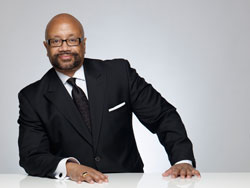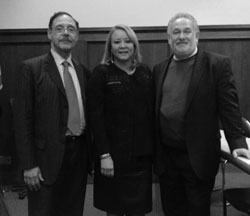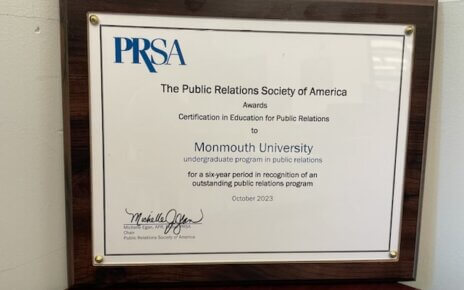A crowd of approximately 40 University students and faculty gathered to hear Dr. Donald Hilliard Jr. discuss issues of gender inequality, violence in America, and the changing family dynamic at the “Searching for Signs of Hope” event in Wilson Hall on Tuesday Feb. 3. The event was the first of many events scheduled on campus to commemorate black history month.
Hilliard discussed the fact that we live in a society where violence is prevalent, especially black on black violence.
“Let it be known that we also wrestle with black on black crime. African Americans are at the top of people who kill each other in Chicago, New York, and California,” said Hilliard.
“After listening to Bishop Donald Hilliard speak, his words really hit home for me, especially when he mentioned black on black crime as one of our biggest issues,” said Britney Wade, senior communication major.
“I live in a very urban and violent city so these are thoughts and feelings that occur within me often,” Wade continued.
The content of the event was based on one of his books, Stop the Funeral which “…is a call to action to rise above the present culture of death and destruction,” according to his official website.
Hilliard discussed the importance of finding sources of hope. “I believe you can live many days without food or water but without hope, we are lost,” said Hilliard. “We are trying to find some type of hope in an era of hopelessness.”
“I think Monmouth students, like everyone else, have to find hope in their surroundings. You do not have to look far to find hope,” said Nina Anderson, Director of the Office of Equity and Diversity at the University who attended the event.
Anderson expressed how Hilliard did an excellent job of explaining the loss of personal interactions between individuals in our generation and the effect that it has had. She also stated the ways in which university students can find hope on and off campus. “He gave the example of gathering to share meals and connecting with each other, which is something students can do. University students can also find hope in volunteering and working with those who are less fortunate or just need general assistance,” said Anderson.
“The main message that I received from attending this event is that we should never lose hope” said Cecilia Henriques, a receptionist at the Counseling and Psychological Services Office who also briefly spoke at the event. “He expressed that moral darkness causes people to hate, but even in the midst of darkness there can be light, and light attracts everything” she continued.
Henriques offered insight on some ways students can find hope and support one another. “…just by showing the light of concern and care for our fellow man, even if it’s over a cup of coffee or dinner listening to someone and letting them know we care, we can make a difference” she said.
Hilliard is a Bishop, painter, and professor, according to his official website. He was called in 1983 to pastorate the Second Baptist Church in Perth Amboy, NJ. “What I have learned in my 32 years of pastoring is that we are all one blood,” said Hilliard.
He described how he believes all people are universally united and should cooperate with one another to find peace. “We may not always agree but we must always be agreeable.”
Hilliard also brought some of his abstract paintings to the University, which was utilized during his lecture to explain how everyone has a different, unique point of view. “Everyone has a different eye. Everyone in this room sees something different. We can accomplish more, do more, bring change to the world.”
“I hope MU students took away the concept of stepping outside of their comfort zone to experience something and someone new,” Anderson continued.
Anderson explained the significance of being thoughtful and the positive effect it can have. “Caring for one another within the community is very important. It can be expressed in many ways, even asking something as simple as, ‘did you remember to lock your dorm room.’ Don’t ever think something is too small and that it will not make a difference or get noticed,” explained Anderson.
“Dr. Hilliard talked about what we can do as a University today to make a change. I hope the that Monmouth students got the message that they can make a difference by simply picking their heads up from their cell phones and laptops,” said Henriques.
Hilliard closed by explaining how people need to see, feel, touch, speak, and reunite in order to put an end to violence in America. “We are often faced with issues that could be resolved if we would speak to each other… there is power in coming together, talking together.”
PHOTO TAKEN from thecathedral.org



